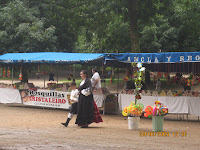
On the west side of the Castro park, the remains of a pre-roman (second century BC to third century AD) settlement always used to be pretty overgrown. In the spring of this year, notices went up warning dog-owners not to let their pets run into the settlement enclave as the grass had been sprayed with something toxic. Then, in the last few weeks the grass in the area has been cleared, piles of stones are around, supports are in place holding up walls and diggers are in action. Something is happening but it is not clear what!
According to one source, information boards which used to be alongside the site were long ago vandalised. All that remain are empty boards but they are supposed to be being replaced soon. Maybe a process of restoration is going on. I await further developments with interest.
 It seems that the settlement was discovered accidentally in 1929 when some trees were being planted but nothing much was done with the discovery until 1952 when archeologists got round to investigating the site. Circular ruins are apparently pre-roman while rectangular ones have been "romanised". Much of the investigation was directed by Jose Maria Alvarez Blazquez who set up an exhibition of his finds in the Quinones de Leon museum in the Castrelos Park, a museum and pazo well worth visiting.
It seems that the settlement was discovered accidentally in 1929 when some trees were being planted but nothing much was done with the discovery until 1952 when archeologists got round to investigating the site. Circular ruins are apparently pre-roman while rectangular ones have been "romanised". Much of the investigation was directed by Jose Maria Alvarez Blazquez who set up an exhibition of his finds in the Quinones de Leon museum in the Castrelos Park, a museum and pazo well worth visiting. Today the Castrelos Park was hosting the festa das penas, the festival of neighbourhood associations. As many of these are connected with local churches there was an open air mass followed by a procession through the park: small and not so small girls in regional dress and the inevitable gaita music.
Today the Castrelos Park was hosting the festa das penas, the festival of neighbourhood associations. As many of these are connected with local churches there was an open air mass followed by a procession through the park: small and not so small girls in regional dress and the inevitable gaita music.The pena
 de actividades creativas had an exhibition of its work in a tent.
de actividades creativas had an exhibition of its work in a tent.
There were the usual stalls selling do-nuts, sweets and plastic windmills for the children but this time there was more.
No fiesta worth its name is complete without a proper feast and this one was certainly worth its name.

Tables were set up for the community lunch and barbecues were busy grilling sardines. The threatened rain restricted itself to a bit of drizzle; nothing was going aguar this fiesta!













































